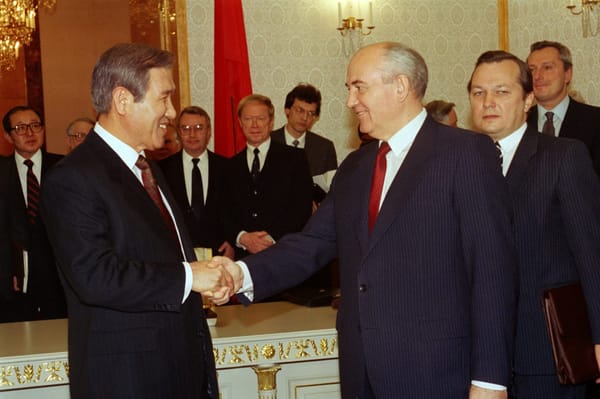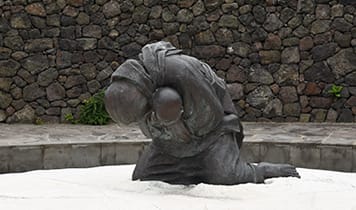Photo: President Yoon Suk-yeol (left) shakes hands with Israeli prime minister Benjamin Netanyahu at the United Nations General Assembly in New York, c. 2023. Credit: Office of the President.
As a formal matter of South Korean diplomacy, Israel is but one country among many in the Middle East. South Korea has followed a friendly but transactional pragmatism in maintaining relationships with virtually every Middle Eastern nation, including those, such as Saudi Arabia, the United Arab Emirates and Iran, whose relationships with one another are considerably more fraught. (See Starter Kit: “South Korea and the Middle East.”)
South Korea’s stance on the longstanding dispute between Israel and Palestine is no exception. Talks on a free trade agreement between South Korea and Israel started in 2016, for example, but languished for years over Israel’s insistence on the inclusion of Palestine in the ambit of the FTA as an implicit assertion of its jurisdiction over the territory. Out of concern for its relationships with other Middle Eastern countries, Seoul resisted the inclusion, and the two countries agreed on the FTA in 2019 only after Tel Aviv relented.
Informally, however, Israel exercises a significant influence in South Korea as a point of reference. South Korea’s national security experts have long studied Israel’s response to the Six-Day War of 1967, and have an interest, for obvious reasons, in Israel’s history of thriving in the face of incursions while surrounded by much larger foes. Israel’s conscription policy and close relationship with the United States have also served as points of reference for South Korean officials in setting military and diplomatic policy.
Koreans who advocate the conscription of women for military service often point to Israel for comparison. The South Korean government is also developing its own version of Israel’s “Iron Dome”, the famed missile defense system that protects the country against rocket attacks by Hamas. Pointing to the “Jewish lobby’s” perceived influence in Washington, South Korean foreign policy thinkers have proposed think tanks, lobbyist groups and grass-roots efforts from Korean Americans, on the model of Israel’s public diplomacy efforts.
Education is another area where others have seen parallels between Israel and South Korea. Zealous Korean parents, seeking to emulate the wisdom of the stereotypically smart and successful Jewish people, have propelled child-rearing books with titles like The Jewish Way of Education 유대인 교육법 up the best-seller lists. Some take it even further: the identification of the Talmud as a source of Jewish excellence has given rise to a fad among some young Korean children for Talmudic studies.
In recent years, Israel has exerted another type of cultural influence in South Korea: right-wing identity politics. South Korea’s far-right has maintained active lines of communication with the US right wing, especially through the network of Evangelical churches that American missionaries helped establish in the wake of the Korean War. The US Evangelical right’s redoubling of support for Israel after 9/11 filtered through the church network into South Korea’s right wing, giving rise to the Korean far-right’s unlikely identification with Israel.
Seoul’s right-wing street rallies, which began under the Moon Jae-in 문재인 presidency in 2017 and continue to this day, prominently feature the Israeli flag, often confusing international onlookers. As the great narrative has shifted from the Cold War battle between the US and the USSR to the new “clash of civilizations” between the Christian West and the Islamic Middle East, South Korean right-wingers have acquired the habit of identifying with Israel to signal that they, too, belong to Christendom.








